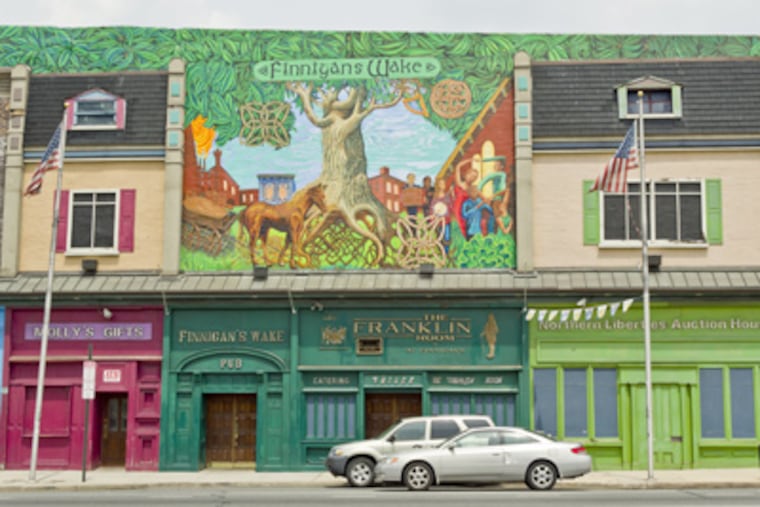Neighbors oppose plans for construction at Finnigan's Wake
The planned reconstruction of a politically wired watering hole in Northern Liberties has reached a stalemate, with the bar owners still at odds with neighbors who fear a spike in noise and who blame City Hall ties for the special legislation needed to get the project off the ground.

The planned reconstruction of a politically wired watering hole in Northern Liberties has reached a stalemate, with the bar owners still at odds with neighbors who fear a spike in noise and who blame City Hall ties for the special legislation needed to get the project off the ground.
"We've just never seen people in this community so unanimously opposed to something," said Matt Ruben, president of the Northern Liberties Neighbors Association since 2002. "They're very, very unhappy about this."
Finnigan's Wake, the tavern on the corner of Third and Spring Garden Streets distinguished by its multicolored faux-Irish-storefront facade, draws hundreds of patrons each weekend.
William G. Stinson, a former Democratic state senator, opened the bar in the old Standard Casket Co. building in 1997 with partners Michael Driscoll, a Democratic committeeman, and lawyer Charles Volz Jr., with early help from another investor - U.S. Rep. Bob Brady, the city's Democratic Party chief. Brady said he gave up his interest in 1998.
The bar has hosted countless political gatherings - including Brady's wedding - and is now neighbor to the new headquarters of the Democratic City Committee. It has also drawn the ire of neighbors for its raucous crowds.
"Even if they don't end up at the bar, they'll end up at another nearby," said Anna O'Brien, 28, a Northern Liberties resident who thinks updating the building could worsen the drunken and rowdy behavior she attributes to Finnigan's clientele.
"That place gets so noisy already I can't imagine it getting any worse," said Heidi Hausner, 45, of Northern Liberties, who said residents need to live about three blocks away in order not to hear the party crowd there on weekends. On Sunday mornings, Hausner said, she avoids walking outside Finnigan's because of the broken bottles that have accumulated on the ground.
The project would primarily serve Finnigan's catering business. Plans include updating the brick facade, adding a two-story balcony over Spring Garden Street for the catering floors, moving the catering entrance to the Bodine Street side, and turning the alley-like section of Bodine into a patio and public green space.
Restricting vehicles from the alley and building over the sidewalk required ordinances that were proposed by then-Councilman Frank DiCicco and pushed through by his successor, Mark Squilla.
Driscoll said he hoped to begin construction in the fall. He estimated the cost at $200,000 to $300,000, all privately funded. With neighbors hostile to the idea of the balcony, construction plans are bouncing between two sides looking to reach an agreement.
City Council unanimously approved bills June 21 legalizing the closing of Bodine Street between Spring Garden and Green Streets, little more than 100 feet, and construction on Spring Garden. The colorful front facade would be re-created facing Bodine Street.
The city Planning Commission recommended allowing construction of a patio and catering entrance on Bodine, but not the street encroachment over Spring Garden. The balcony would extend more than 14 feet out from the building.
Ruben said that expanding the bar would reward unneighborly behavior, and that residents saw the legislation as a special service to Driscoll. Driscoll denied receiving any special treatment.
The building shows wear, with discolored and crumbling bricks at the corners. Driscoll said he and his partners want to improve the property as well as the Spring Garden commercial corridor.
Approving the balconies should encourage discussion about the appearance of Spring Garden Street, said Harris Steinberg, director of Penn Praxis, the research arm of the University of Pennsylvania's School of Design.
Steinberg said the balconies would be a handsome improvement, and doubted that patrons on them would significantly increase noise in the already busy area. But he questioned whether the project would or should establish a precedent.
"If this were to happen all up and down Spring Garden, what would that look like?" he asked. "It may be good, it may be bad."
Given the negative community reaction, Squilla promised the neighborhood association that Finnigan's would not build the balconies until an agreement was reached with the community.
Squilla said once an agreement was reached, he hoped the construction would improve the appearance of the area. The section of Bodine in question is in disrepair and blocked by Finnigan's Dumpsters.
"It's something the community could work with and the business could work with to make this a better area," Squilla said.
Driscoll said he had heard neighbors' complaints and was working with those who are unhappy; he said he had also heard from those looking forward to the updates. The number of patrons allowed in the bar and catering halls will not increase once the balconies are added, he said. A typical weekend night brings in several hundred bar patrons, he said, and a catered event usually has 250 guests.
The real problem in the neighborhood, Driscoll said, is parking. He said it would be better for the community to unite over that and resolve it.
Ruben said that moving the balconies from the side to the front would not be an improvement, and that he had received more than 400 complaints about the proposed construction.
Despite the promises of cooperation, Ruben said, there is still concern because the legislation was approved. He said that he had not heard recently from Driscoll and that Finnigan's Wake had not yet shown the neighborhood association any revised construction plans. The only way to appease the neighborhood would be to cancel the plan for balconies, Ruben said.